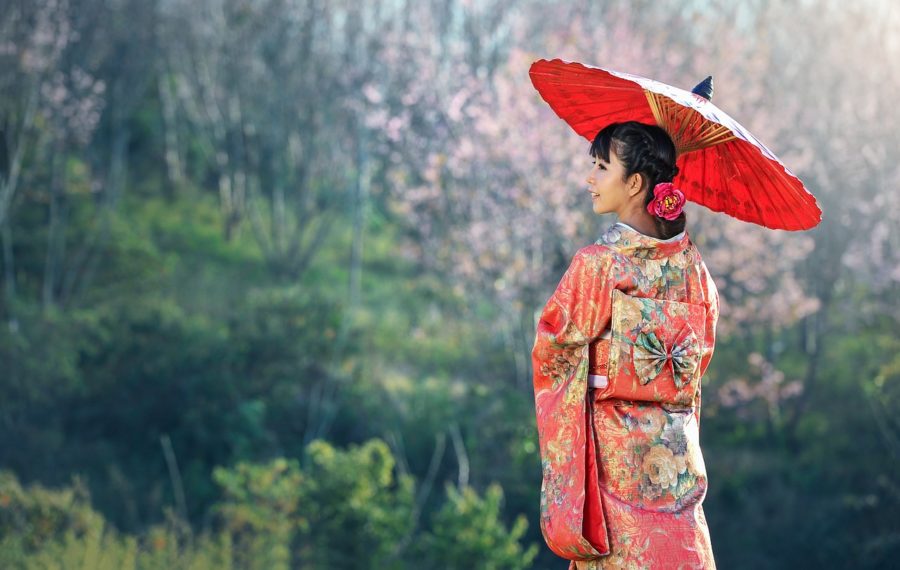Japanese Words that are Hard to Translate into English
Japanese is a language which includes beautiful words that encapsulate small, simple and unique meanings. This may be so because of their poetic history, or their want to express specific parts of nature, life or human behavior. Many of these words however unfortunately have no English counterpart or are difficult to translate to English. Therefore, to understand these words in English, the following explanation of 11 distinctive Japanese words will hopefully share their rich meaning.
Komorebi (木漏れ日)
Komorebi refers to the soft sunlight that filters and seeps through tree leaves. This word emphasizes the Japanese appreciation for nature and the simple things. It describes a specific imagery of a peaceful, warm scene in nature. It is written with the combination of four characters: 木漏れ日. Of these four, the first character of “木” means tree. The second and third characters (漏れ) create the word leakage. Lastly, the last character of “日” refers to the sun. Together, they form a word that allows us to acknowledge and value a beautiful natural phenomenon.
Ikigai (生きがい)
Ikigai is the meaning of life, the motivation in life or the reason to live. Iki, written as “生き” means to live, so ikigai (生きがい) is related to our drive to continue living. The fact that such a weighted concept is able to be expressed in one word is enchanting and oddly has no English equivalent.
Nekojita (猫舌)
Nekojita is directly translated to “cat tongue”. The real meaning, however, refers to a person who is unable to eat hot food. The word originates from the fact that cats are sensitive to hot foods. People who have to wait or blow on their food for it to cool down just enough for it to be edible have nekojita.
Shouganai (しょうがない)
Shouganai cannot be translated as a combination of different words as the 3 previous words have been. This word merely does not exist in English. The closest phrases that are able to convey its meaning are “it is what it is” or “it can’t be helped”. Shouganai basically refers to something that is out of our control and is often used as a reaction to such an uncontrollable situation.
Itadakimasu (いただきます)
Itadakimasu is a word which Japanese people say before they eat food. The literal translation is “I humbly receive”. The meaning is similar to “thank you for the meal” or the French “bon appetit”. The depth of the meaning is however more grateful and appreciatively directed to those who prepared the meal.
Otsukaresama (お疲れ様)
Otsukaresama is directly translated to “I am tired”, however it is used when thanking someone for their hard work. 疲 means ‘tired, fatigued, exhausted’. Japanese people often say this after finishing a long day of work or school to appreciate others’ hard work and effort.
Ganbatte (頑張って)
Ganbatte is an encouraging word that is similar to phrases such as “good luck”, “put effort into it”, “you got this” or “do well”. In Japanese its meaning is close to the idea of “do your best”. Japanese people use it to cheer on others.
Tsukimi (月見)
Tsukimi refers to the event or act of viewing and appreciating the moon. When literally translated as individual characters, tsuki (月) means the “moon” and mi (見) means “to look”. This word once again showcases the Japanese appreciation of nature.
Mottainai (勿体ない)
Mottainai is similar to phrases such as “what a waste”, “unworthy of” or “what a pity”. Its meaning however has a regretful emotion to it rather than an apologetic connotation. It refers to something that could have been used for a better cause or used in a wiser manner. If someone receives something that they lack gratitude for, then it is too good for the person, does not deserve to be given to the person, is a waste and is mottainai. This again displays the Japanese need for appreciation and gratefulness of objects and opportunities in an individual’s life. There is unfortunately no direct translation, phrase or word that manages to capture this word’s meaning in English.
Hikōkigumo (ひこうき雲)
The literal translation of hikōkigumo is “plane cloud”. It describes the cloud of smoke trails created behind a plane. When saying this word, one can imagine the white lines left behind by jets and planes in a blue sky.
Urokogumo (鱗雲)
Lastly, urokogumo is directly translated to “scale clouds” when looking at the specific characters individually. The meaning of the two characters combined together however refers to a sky full of scale-like clouds. A sky has urokogumo when the clouds form the beautiful pattern of the scales on a fish. This is a gratifying way to reference a fish to be floating in the sky.
Overall, these are some examples of Japanese words that cannot be directly translated into an English definition. They all have a poetic connotation or an appreciation for nature because these are core, cultural aspects of Japan. Languages truly are beautiful.










